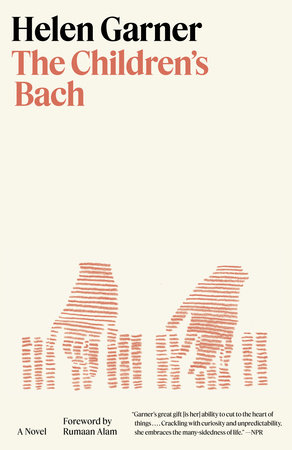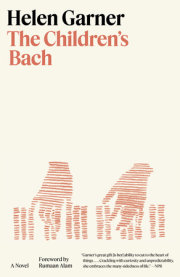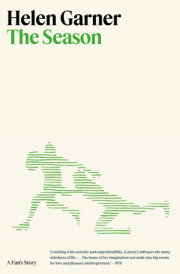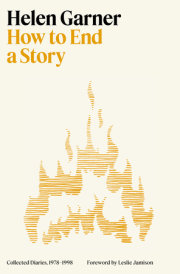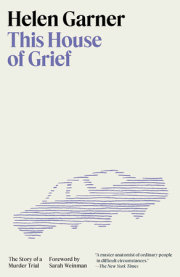Dexter found, in a magazine, a photograph of the poet Tennyson, his wife and their two sons walking in the garden of their house on the Isle of Wight. To the modern eye it is a shocking picture: they are all, with the exception of the great man himself, bundled up in such enormous, incapacitating garments. Eye-lines: Tennyson looks into the middle distance. His wife, holding his arm and standing very close to his side, gazes up into his face. One boy holds his father’s hand and looks up at him. The other boy holds his mother’s, and looks into the camera with a weak, rueful expression. Behind them, out of focus, twinkles the windy foliage of a great garden. Their shadows fall across the lawn: they have just taken a step. Tennyson’s hands are large square paws, held up awkwardly at stomach level. His wife’s face is gaunt and her eyes are set in deep sockets. It is a photo of a family. The wind puffs out the huge stiff curved sleeve of the woman’s dress, and brushes back off his forehead the long hair of the father’s boy who is turned towards the drama of his parents’ faces; though he is holding his father’s hand, he is separate from the group, and light shows between his tightly buttoned torso and his father’s leg.
Dexter stuck this picture up on the kitchen wall, between the stove and the bathroom door. It is torn and stained, and coated with a sheen of splattered cooking grease. It has been there a long time. It is always peeling off, swinging sideways, dangling by one corner. But always, before it quite falls off the wall, someone saves it, someone sticks it back.
~
At night, when they had put the children to bed, Athena and Dexter walked. They were ruthless about going, and would barely even check that the boys were asleep before they set out. They gossiped and reported to each other the day’s residue.
‘See that house?’ said Dexter. ‘Outside there this morning, on my way to work, I unwisely engaged in a conversation with a senile know-all. I’m glad
you think it’s funny.’
Dexter walked with a bandy, rapid gait. They kept pace easily, not touching. They covered miles each night in the dark, sometimes heading east along the creek across the parklands to where it joined the Yarra River, sometimes north-west as far as the huge upturned saucer of Royal Park where the wild dogs in the zoo howled at the moon and monkeys gibbered behind the wall. Dexter pursed his lips and whistled a curly tune. He was an old-fashioned joyful whistler who loved merry trills, and as he approached the climax of the melody he stopped walking, turned to Athena and raised one crooked forefinger to alert her to his impending triumph.
‘And now,’ he announced at the crossroads outside a bank, ‘I shall sing the catalogue aria from
Don Giovanni.’ He had once been told by an egalitarian friend of his father’s that he had a fine voice. He fancied himself a dramatic baritone in the Russian style, but could also turn out a creditable version, word-perfect, of ‘The Vicar of Bray’ or ‘Jerusalem’. Dexter wanted to live gloriously, and on the night walks he did, making fami-lies turn from their screens, trumpeting through the dreams of children, setting dogs to roar and scrabble behind tin fences.
‘You never sing!’ he cried, all aglow, to Athena.
‘Yes, I do,’ she said, but he had already struck up another chorus. She loved him. They loved each other. They were friends. They lived in a sparsely furnished house near the Merri Creek: its walls were cracking, its floors sloped and its doors hung loosely in their frames. There was a piano in the kitchen and during the day Athena would shut herself in there under the portrait of Dexter’s father and pick away at Bartok’s
Mikrokosmos or the easiest of Bach’s Small Preludes. Preludes to what? Even under her ignorant fingers those simple chords rang like a shout of triumph, and she would run to stick her hot face out the window. There were days, though, when her approach to the music, under the portrait with its yearning, nineteenth-century look, was so unrhythmic and lacking in melody that she was ashamed, as if she had defaced an altar, and she closed the piano and went out into the backyard with a broom. Over the back fence, nearer the creek, lived an old couple whom Dexter and Athena had never seen but whom they referred to as Mister and Missus Fuckin’. They drank, they smashed things, they hawked and swore and vomited, they cursed each other to hell and back.
~
How strange it is that in a city the size of Melbourne it is possible for two people who have lived almost as sister and brother for five years as students to move away from each other without even saying goodbye, to conduct the ordinary business of their lives within a couple of miles of each other’s daily rounds, and yet never to cross each other’s paths. To marry, to have children; to fail at one thing and to take up another, to drink and dance in public places, to buy food in supermarkets and petrol at service stations, to read of the same murders in the same newspapers, to shiver in the same cold mornings, and yet never to bump into each other. Eighteen, twenty years may pass! How strange!
Had Dexter and Elizabeth thought of each other during this time? Of course they had, Dexter more than Elizabeth, not because of any imbalance of affection, but because Dexter was mad about the past. He believed in it, it sustained him, he used it to knit meaning into the mess of everything. He recited it in anecdotes told always in the same words. He even recalled in detail dreams that other people had had years before. Elizabeth disliked the past. It was full of embarrassment. She and Dexter had never been in love, but once she lay on his bed, in college, a whole Saturday after-noon waiting for him to come back because she wanted to fuck somebody and at the time there was no-one else. She lay there all hot and impatient for hours but he didn’t come back and he didn’t come back, and she got up and leaned out the narrow window, through which a warm wind was blowing, and she heard shouts from the university oval and realised he must be out there playing cricket. She got off the bed, straightened the blanket, and went back across the garden and through the gate to her own room in the next building. She was cross. And she never told him about it. The victories she scored against his voracious memory were small.
~
In her wallet Elizabeth had a photo. On a bare wooden verandah stood a two- handled tartan overnight bag. The bag looked stable; it was packed solid. The top zip was undone. Out of it, between the two curved handles, stuck a child’s head. The face looked straight at the camera, round and unsurprised. Its hair was tangled, its skin was dark, the whites of its eyes were bright white. On the back of the picture, in their mother’s loose, frightening hand, were the words: ‘Vicki: precious cargo’. Their mother had dropped her bundle, and died. What is possible between two sisters born twenty years apart? Is the elder one to be sister, or mother?
Elizabeth was sitting up in bed at one o’clock in the morning doing her crochet and watching
Designing Women on TV. The telephone rang just as the dog was about to make its appearance carrying the husband’s shoe. Elizabeth heard the pips.
‘Vicki. Is anything wrong?’
‘Not exactly.’
‘What’s the time over there?’
‘Ten o’clock in the night.’
‘I can’t come over again,’ said Elizabeth. ‘I don’t know why you’re ringing me. The phone bill must be colossal. Have you been going to school?’
‘Sort of. Not all that much.’Elizabeth kicked the cooling hot- water bottle off the end of the mattress. The top sheet was stolen, the bottom one paid for. They made a pair.
‘You swore you were old enough to look after yourself. I warned you. I told you I couldn’t keep on coming over. Do you know what that airfare costs?’
‘I don’t want you to come over,’ said Vicki. Her voice was dull. ‘I made a mistake. I want to come over there.’
‘To
live?’
I’m only seventeen.’
‘Last time we had this discussion, seventeen was adult, remember?’
The girl said nothing. The line hissed and sang. Their mother was dead and they were making a mess of things.
~
Copyright © 2023 by Helen Garner. All rights reserved. No part of this excerpt may be reproduced or reprinted without permission in writing from the publisher.

